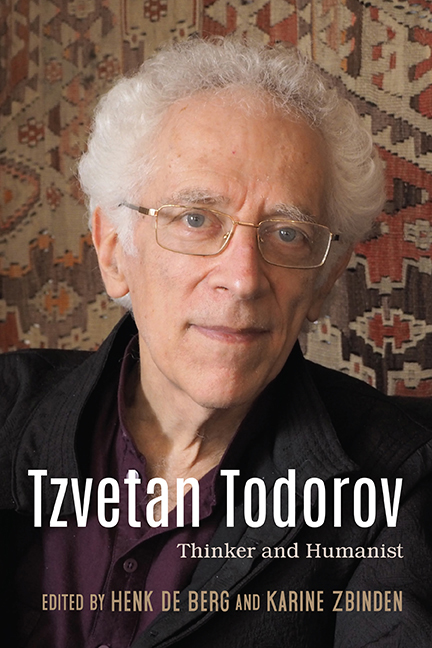Book contents
- Frontmatter
- Contents
- Acknowledgments
- Introduction
- 1 A Marginal Centrist: Tzvetan Todorov and the French Intellectual Field
- 2 Todorov and Camus
- 3 The Enlightenment Redux: Autonomy in Todorov, Glucksmann, and Onfray
- 4 Todorov's Reading of Rousseau: A Heritage for Our Times?
- 5 Tzvetan Todorov's Enlightenment
- 6 Todorov and Bakhtin
- 7 Tzvetan Todorov and the Writing of History
- 8 Tzvetan Todorov and the Trials of History: A Dissenting Voice
- 9 European Integration and the Cultural Cold War: Todorov and Denis de Rougemont
- 10 Tzvetan Todorov on Totalitarianism, Scientism, and Utopia
- 11 Tzvetan Todorov's Political Philosophy
- 12 Interview with Tzvetan Todorov
- Notes on the Contributors
- Index
6 - Todorov and Bakhtin
Published online by Cambridge University Press: 26 April 2020
- Frontmatter
- Contents
- Acknowledgments
- Introduction
- 1 A Marginal Centrist: Tzvetan Todorov and the French Intellectual Field
- 2 Todorov and Camus
- 3 The Enlightenment Redux: Autonomy in Todorov, Glucksmann, and Onfray
- 4 Todorov's Reading of Rousseau: A Heritage for Our Times?
- 5 Tzvetan Todorov's Enlightenment
- 6 Todorov and Bakhtin
- 7 Tzvetan Todorov and the Writing of History
- 8 Tzvetan Todorov and the Trials of History: A Dissenting Voice
- 9 European Integration and the Cultural Cold War: Todorov and Denis de Rougemont
- 10 Tzvetan Todorov on Totalitarianism, Scientism, and Utopia
- 11 Tzvetan Todorov's Political Philosophy
- 12 Interview with Tzvetan Todorov
- Notes on the Contributors
- Index
Summary
IT IS COMMON TO VIEW Tzvetan Todorov's life as made up of two distinct parts. There is less consensus, though, on what may constitute these two parts. Is it structuralism and humanism? Literary theory and philosophy? Or totalitarianism in Bulgaria and liberal democracy in France? How one defines these two parts of course influences when one would set the break. Although his thought evolved over several years, Todorov himself conceded that his engagement with Mikhail Bakhtin’s work had a decisive impact on his own approach, that it was “the dividing line,” thus drawing it in the late 1970s to early 1980s. In more recent years though, Todorov glossed on his childhood and youth under communist rule in his native Bulgaria and how this background had shaped his thinking. This would suggest the existence of another dividing line, much earlier, in the early 1960s, when he moved from communist Bulgaria to democratic France. Totalitarianism obviously stands in stark contrast to democracy politically. But for Todorov that early break was no less sharp in personal terms: before the demise of the various Eastern European regimes in the years following the fall of the Berlin Wall in 1989, a move from Bulgaria to Fr ance constituted an irremediable split. Yet Todorov himself complic ates this picture by pointing out that until the demise of communist Bulgaria he remained in some ways hostage to his homeland's regime for fear that his views might trigger reprisals against his parents and the other family members he had left behind. It is worth noting that he did not defect but that his departure was entirely legal: he went to study for a year in Paris, then stayed for another two years, and finally was granted permanent residency before gaining French citizenship ten years later in 1973.
These considerations aside, Todorov himself highlights his encounters with Arthur Koestler and Isaiah Berlin as two crucial moments in the development of his thought. From the former, he garnered the feeling that his own apolitical stance was fruitless. From the latter, he took away the idea that philosophical topics such as nihilism and liberalism might be worth studying. Literature, Berlin had told him, “is not made up of structures alone, but also of ideas and history.”
- Type
- Chapter
- Information
- Tzvetan TodorovThinker and Humanist, pp. 109 - 126Publisher: Boydell & BrewerPrint publication year: 2020



